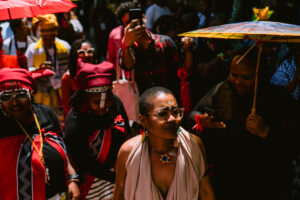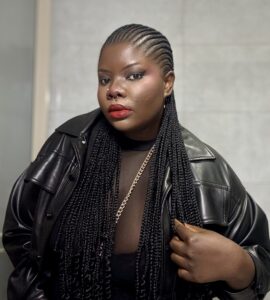African lesbians today face significant discrimination and violence at the intersection of homophobia and misogyny in deeply patriarchal societies, despite their crucial roles in feminist and queer organizing across the continent. Lesbians have long been essential in advancing human rights, yet we remain marginalized, even within spaces meant to be safe. The labeling of feminists as “lesbians” is often weaponized to delegitimize feminist movements, reflecting both homophobia and the patriarchal fear of losing control over women. As lesbians, our lives are viewed as a threat to patriarchy, not only because of our resistance to male authority but because our very existence challenges the norms of submission and domestication expected of women in patriarchal structures. These dynamics often disrupt the deeply entrenched power relations that seek to control women’s bodies and roles in society.
African lesbian folks face the harsh reality of some of the most significant discrimination, marginalization, and violence. Our lives sit at the intersection of various oppressions. Within movements, despite the great contributions to organizing for rights, lesbians are still othered even in spaces that ought to be safe and are often less visible in dominant public discourse compared to other members of the LGBTIQ+ community.
Lesbians, like all queer Africans, have a long history on the continent, acknowledged and even celebrated in many precolonial African societies.
For example, the Nandi of Kenya practised woman-to-woman marriages to preserve lineage, the Igbo of Nigeria recognized ‘female husbands.’ In Dahomey (Benin), women in military and royal roles formed close bonds with other women. Such traditions, highlighted in works like Prof. Sylvia Tamale’s African Sexualities and Boy-Wives and Female Husbands by Murray and Roscoe, affirm that these relationships are neither modern constructs nor ‘lifestyles’ but deeply rooted in African cultural history.
In 2024, I attended my first ILGA World Conference in Cape Town, South Africa, and it came with a mix of emotions, some of which I am still trying to get to the bottom of. I had marked key conversations I didn’t want to miss ahead of the conference: the Women’s Conference, the Lesbian preconference, and “Married Without Choice – LBQ Realities and the Discourses on Gender-Based Violence.” I was seeking answers on how we can better work with Lesbian, Bisexual and Queer (LBQ) women, particularly lesbian women, who are often invisible within both the mainstream LGBTIQ+ movement and feminist movements.
In the LGBTIQ+ movement, lesbians, especially those who don’t conform to stereotypical gender norms, are often overlooked as the focus tends to be on issues affecting gay men, leaving the unique struggles of lesbian women underrepresented. In feminist spaces, LBQ women are marginalized because their experiences are sometimes seen as outside the scope of traditional heterosexual approaches to gender equality. This marginalization leaves LBQ women to navigate both homophobia and misogyny in both communities concurrently.
Curating Spaces for Lesbians Africa and Beyond
The Lesbian Pre-Conference, organized by the Global Lesbian Coalition, focused on creating dedicated spaces to amplify lesbian voices globally. It addressed the marginalization of lesbians within broader LGBTIQ+ and feminist movements, highlighting the need for intentional inclusion. Key discussions centered on the challenges lesbians face in accessing resources, representation, and advocacy platforms. Participants shared strategies for global solidarity, emphasizing the importance of centering lesbian identities in global and local activism. A call was made for actionable steps to strengthen networks and ensure meaningful participation for lesbians in global movements.
Global Lesbian Coalition (GLC) is a newly formed coalition of five LBQ networks from around the world that provides space for lesbians. Here, African lesbian feminists revisited the need for a regional African LBQ feminist collective to replace the Coalition of African Lesbians (CAL) that formerly held 14 nonprofits across 10 African countries. Despite its significant achievements, including securing AU observer status in 2015 after years of rejection, CAL was disbanded in 2022, leaving a void in organizing and advocacy for African lesbians. We need a pan-African, unapologetically lesbian coalition.
I spoke with Suleiya Abdi, an activist from Tanzania, on the situation in her country. “Often, as lesbians in Tanzania our issues are grouped with those of sex workers because we are both seen as ‘sexual deviants’, or we are lumped with adolescent girls and young women because our issues are viewed as generic women’s issues which makes sense as we tend to face the same issues because of how inter-connected our oppressions are.”
She highlights the dangers of presenting particular groups’ concerns as mutually exclusive, which, in the end, contributes to the already existing erasure and misrepresentation of both LBQ women and sex workers in Tanzania. As we concluded, she urged African LBQ women to claim spaces in LGBTIQ+ activism and formulate a diverse African lesbian collective representing all countries.
Married Without Choice
Forced marriage and corrective rape remains the most prevalent form of violence lesbians face. Along with other forms of the so-called “conversion therapy” that many lesbians across the continent are forced to undergo in attempts to make them conform to heterosexuality. According to a report by Human Rights Watch titled “This Is Why We Became Activists,” Lesbian, bisexual, and queer (LBQ+) people around the world are affected by marriages to men they did not want to enter or cannot leave.
The Married Without Choice: LBQ Realities and Discourses on Gender-Based Violence panel brought out stories of forced marriages, corrective rape, and societal pressures to conform to hetero-normative expectations across Africa and beyond. A speaker from Nigeria spoke of the LBQ women, particularly lesbians in their country, opting to marry men for safety and survival.
“For queer women in my country, marriage is often a survival strategy as it provides a semblance of safety and social security in a homophobic environment. Plus, marrying a man comes with financial security which alot of lesbians do not have,” she shared.
Other panelists spoke on how queer women are forced to choose between their identity and their safety, often marrying men to avoid violence or ostracization from their communities. Shame and ostracization force lesbians to marry men, further pushing them into isolation with zero to no support system. These conversations highlighted the unique and disproportionate vulnerability of LBQ women to gendered patriarchal violence. There was a call for more support groups for LBQ women in countries and the integration of married LBQ women into existing programs.

LBQ Women and Women’s Rights Movement
At the Women’s Conference, we explored cis and trans solidarity, emphasizing the importance of intersectional unity against the current well-funded anti-gender movements in Africa and beyond. Solidarity across gender identities is critical in resisting patriarchal and religious fundamentalist efforts that target all women in Africa.
“Patriarchy as a system harms us all, both trans and cis women, so the trick is to know how best to come together and define what solidarity looks like to us,” says Amina*. “As we fight because we are pitted against each other to see who is more of a “woman” than the other, patriarchy will always win at the end of the day.”
I was reminded of home and how these struggles play out. In Kenya, the lack of solidarity between feminist and queer movements exacerbates the erasure of LBQ women. The current femicide crisis in Kenya is a good example, with femicide in Kenya framed as a heteronormative issue, focusing on male-perpetrated violence against women in heterosexual relationships and mostly ignoring violence against LBQ women, including homophobic murders. Feminist movements often fail to address the intersection of gender and sexuality, further marginalizing LBQ voices and lives.
Additionally, the rise of “conditional feminism,” where individuals claim feminism that seeks to exclude queer women, sex workers, are against abortion etc, contradicts the inclusivity and intersectionality emphasized in the fundamentals of feminism as we know it as a struggle against all intersecting oppressions that keep people of diverse genders in exploitative and undignified existence.
The exclusion of African lesbians from both feminist and LGBTIQ+ movements highlights the patriarchal and heteronormative socialisation and systems that persist, even within spaces designed to challenge them. To achieve true equality, especially with the global rise in funded anti-LGBTIQ+ and anti-rights campaigns, both LGBTIQ+ and feminist movements must prioritize working with and including LBQ women in their work and activism in ways that are beyond the current tokenism. Without this, the broader struggle for queer and feminist liberation remains incomplete.
*Names Changed for security reasons

Afrika, she/her/hers, is a Pan African, radical, lesbian feminist from Kisumu, Kenya. She has done feminist and LGBTIQ+ organizing work for the last 8 years. She is currently the coordinator of Kisumu Feminists Society, a young feminist collective for LBQ (Lesbians, Bisexual and Queer) based in Kisumu. You can always find her thoughts on X – @DecolonialBruja.
This piece is part of our African Feminist Takes from the 31st ILGA World Conference. Between 11 to 15 November 2024, the ILGA World Conference was hosted in Africa for the first time in 25 years in Cape Town, South Africa. The ILGA World Conference is the largest global gathering of LGBTIQA+ changemakers bringing together LGBTQIA+ human rights defenders and development experts, policy makers, international human rights mechanisms experts, researchers, journalists, funders, and allies worldwide.
The conference convened under the theme Kwa umoja we rise!, a mix of Swahili and English – “Kwa umoja” meaning “Together” or “In unity’’, came at a time when many African feminist and queer movements are dealing with ongoing anti-rights pushback. African LGBTQIA+ movements are actively advocating for social justice alongside other groups, yet they face specific, ongoing violence and discrimination, and they risk losing hard-won rights. More than most, they face an environment of scapegoating, making human rights efforts increasingly challenging. Despite these setbacks, there’s been some progress in some countries in recent years, underscoring the critical need for solidarity and collaboration across movements. In the face of violent opposition, building bridges and inclusive movements in the pursuit of justice and a better future for all is essential.
African Feminism – AF, with the support of the African Women’s Development Fund (AWDF), collaborated with African feminists to share their perspectives from the conference, stand in solidarity with and support queer liberation movements on the African continent. This collaboration is centered on amplifying voices and narratives through an intersectional lens, highlighting emerging issues and lived experiences, while enhancing resistance and feminist consciousness.
The African Women’s Development Fund (AWDF) stands at the heart of Africa’s feminist movement as a transformative feminist fund dedicated to resourcing, nurturing, and strengthening women’s rights initiatives and feminist movements across the continent. As an active partner and fierce champion for gender justice, AWDF supports organisations to build sustainable foundations while creating lasting, systemic change across Africa.

And activism like these are dope and great cause this is what will bring those who fear out to support and fight for what they believe as we shun from archaic barbaric norms based on gender, gender roles, culture and step off the beaten track,,, Gracias Afrika
I search for a discusion community for lesbian radical feminists whonare also separatistst, antipsychiatry and antinatalists.